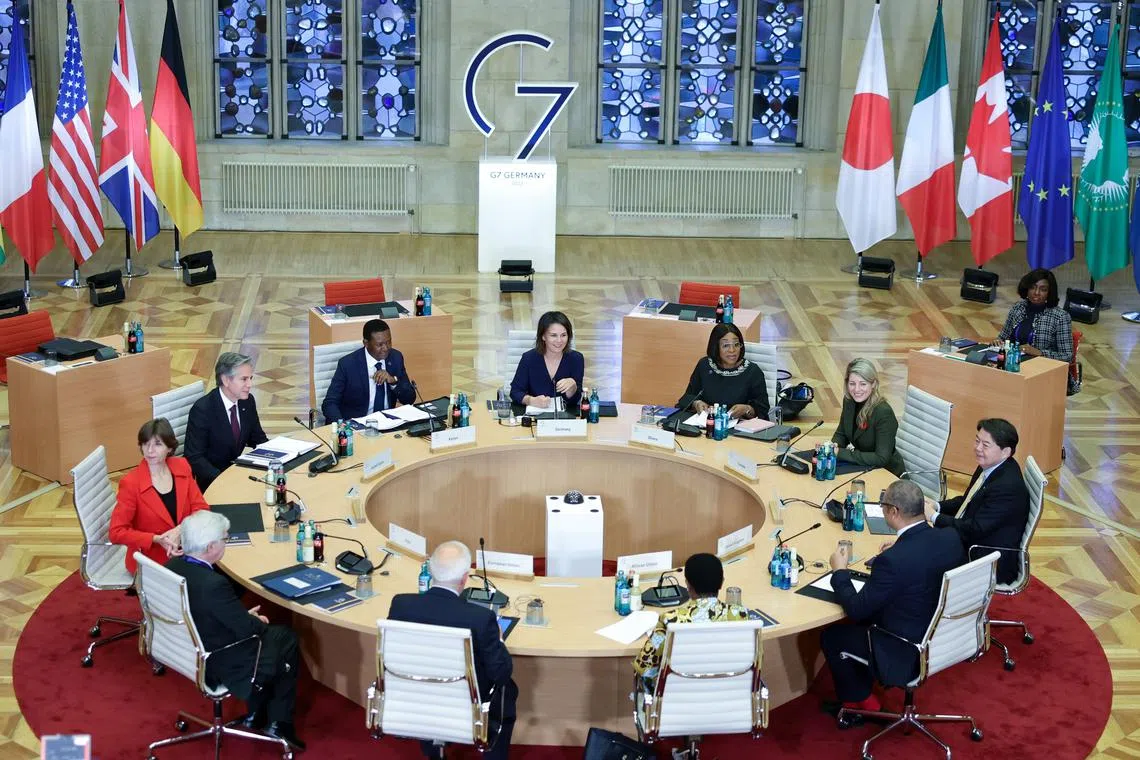G-7 urges China to abstain from threats, use of force
Sign up now: Get ST's newsletters delivered to your inbox

The G-7 increasingly agrees on the need for a coordinated response to Chinese President Xi Jinping’s ambitions.
PHOTO: EPA-EFE
Follow topic:
MUENSTER, Germany – The Group of Seven (G-7) on Friday urged China to abstain from “threats, coercion, intimidation, or the use of force”, while expressing their aim for cooperation where possible to tackle global challenges including security, global health and climate.
The communique, wrapping up two days of meetings by the foreign ministers of the world’s seven wealthiest democracies, also reiterated the importance of peace and stability across the Taiwan Strait.
The G-7 increasingly agrees on the need for a coordinated response to Chinese President Xi Jinping’s ambitions following a congress of the ruling Communist party in October,
The gathering coincided with a one-day visit by German Chancellor Olaf Scholz to China, which fuelled concern that Germany would continue to prioritise economic relations with its largest trading partner over security and strategic considerations. This could risk divisions among Western allies that have sought to adopt a tougher stance towards China in recent years.
“We remind China of the need... to abstain from threats, coercion, intimidation, or the use of force”, the communique said. “We strongly oppose any unilateral attempts to change the status quo by force or coercion.”
The G-7 said it remained “seriously concerned about the situation in and around the East and South China Seas” after China earlier this year staged war games around Taiwan.
Beijing views Taiwan as a renegade province awaiting reunification with the mainland, by force if necessary.
The G-7 also said they would continue to raise concerns with China on its reported human rights violations and abuses, including in Xinjiang and Tibet, and on the “continued erosion of Hong Kong’s rights, freedoms and autonomy”.
The US State Department official told reporters there was had been an “increasing convergence of the views on what China’s ultimate strategy, both domestically but also globally, is ”over the last 1-1/2 years.
“Coming out of the party congress, I think there’s an increasing recognition of ultimately what President Xi’s ambitions are and the need for a coordinated response to that,” he said, speaking on condition of anonymity. “That’s something that I think will be a focus of this group as we head into Japan’s presidency next year,” he noted, referring to Japan taking over the G-7’s rotating presidency from Germany at the start of next year.
Sino-Japanese relations have long been plagued by a dispute over a group of uninhabited East China Sea islets - called the Senkakus in Japanese and Diaoyus in Chinese, a legacy of Japan’s World War II aggression and regional rivalry.
On Friday, Japan’s Sankei newspaper reported that the Japanese and Chinese governments had started planning a meeting between Mr Xi and Japanese Prime Minister Fumio Kishida for mid-November alongside an international conference set to take place in South-east Asia.
European Union foreign policy chief Josep Borrell cautioned earlier in the day that China should not be put in the same category as Russia, which invaded Ukraine in February.
“It is clear that China is... becoming much more assertive, much more on a self-reliant course,” Mr Borrell told reporters. “But for the time being, many member states have a strong economic relationship with China, and I don’t think we can put China and Russia on the same level.”
The G-7 said in their statement that they aimed for “constructive cooperation with China, where possible and in our interest” on global issues such as health and climate change. REUTERS

